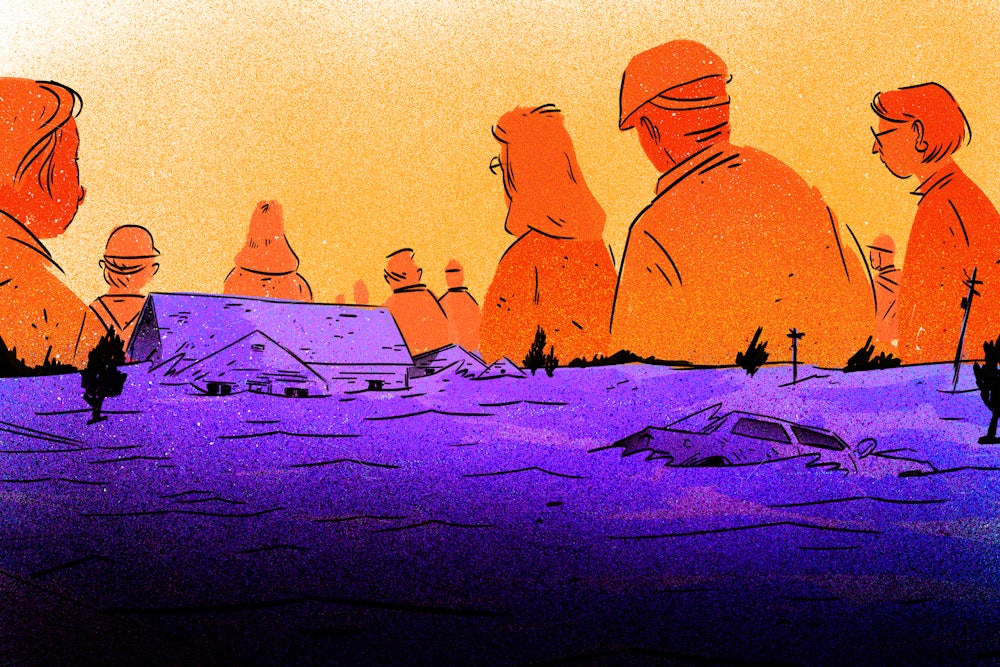In 2005, I wrote a piece for The Nation surveying the immediate aftermath of Hurricane Katrina. I concluded it on this cautionary note:
We have to be clear that what happened in New Orleans is an extreme and criminally tragic coming home to roost of the con that cutting public spending makes for a better society. It is a shocking foretaste of a future that many more of us will experience less dramatically, often quietly as individuals, as we lose pensions, union protection, access to healthcare and public education, Social Security, bankruptcy and tort protection, and as we are called upon to feed an endless war machine.
I’ve often revisited that warning over the past year, as we’ve suffered—and died—through the overlapping breakdowns of federal, state, and municipal governance in the midst of a grave public health crisis. And this February’s deadly failure of Texas’s water and power infrastructure in the face of an unusual stretch of winter storms served as yet one more reminder of the sort of large-scale disaster that commonly results from decades of relentless, bipartisan demonization of government.
Katrina was a natural event—aside, that is, from the acceleration of extreme weather catastrophes under climate change—that barreled into a community besieged by the slower-rolling disaster of neoliberal governance. The cycle of strategic pillaging of public goods that produced the Katrina disaster is by now well documented: Free-market ideologues neglect the public welfare for decades; they then privatize and starve out funding for public goods and services; and finally point to the resulting shortfalls in public-sector performance created by their handiwork as a rationale for cutting funding and neglecting these critical services and infrastructures even more.
As New Orleans managed to sidestep a series of devastating storms that had borne down on the city in the years before Katrina, the response of government at all levels was essentially to whistle past the graveyard. Political leaders and high-level government functionaries continued to ignore annual warnings that the area’s levee system was inadequate and likely would not withstand a direct hit from a Category 4 or 5 storm. Katrina made landfall as a Category 3, and New Orleans avoided a direct hit. But contrary to the forecasting consensus, the levees failed anyway, and as residents initially assumed they had dodged another bullet, the city filled with water.
As terrible as the flooding was, the collapse of any sort of coordinated or effective government response compounded the horror. In the immediate aftermath of the storm’s landfall, city residents trapped in their homes or exiled from the waterlogged city kept waiting, to no avail, for the National Guard or U.S. Army Corps of Engineers to show up and begin plugging the breaches and conducting rescue efforts. Insult and injury turned to outrage when storm victims learned that the Louisiana National Guard couldn’t muster an effective disaster response because more than 3,000 of its troops had been deployed to Iraq. President George W. Bush mostly ignored and downplayed the scale of the devastation—until he could no longer afford to.
By contrast, President Lyndon B. Johnson had toured the city the day after Hurricane Betsy, the next most devastating storm to hit New Orleans, made landfall in 1965. He famously visited a Ninth Ward shelter crowded with displaced flood victims and announced, “This is your president! I’m here to help you.” The day after he returned to the White House, Johnson sent Mayor Victor Schiro a 14-page telegram outlining plans for aid and reconstruction for the city.
The difference between his and Bush’s reactions reflected more than a temperamental divide between the two Texans. These two New Orleans set pieces mark the consequences of a relentless attack on government and the idea of the public good. Jimmy Carter ran for the presidency—as a Democrat—in 1976 partly on his record of shrinking government during his term as Georgia’s governor, and he served in the White House as a deregulator. But Carter was only the warm-up act for Ronald Reagan, who radically intensified the attack on government.
Reagan pioneered a new stage of cynicism on the right by appointing agency heads with the mission to destroy the agencies they led. Samuel Pierce, his secretary of housing and urban development, debased HUD’s mission and treated its budget as a slush fund for Reagan’s cronies. James Watt understood that his task as secretary of the interior was to aid the mass privatization of public land, and he contended that the department should be “the Amicus for the minerals industry.” William Bradford Reynolds, assistant attorney general for the Justice Department’s Civil Rights Division, consistently opposed civil rights enforcement. Future Supreme Court Justice Clarence Thomas, then Reagan’s appointee to head the Equal Employment Opportunity Commission, was a militant foe of anti-discrimination enforcement. And Reagan’s choice to head the Environmental Protection Agency, Anne Gorsuch, slashed the EPA budget, retreated from enforcing regulations, and hired key staff from industries that were supposed to be under her regulatory jurisdiction. These are but a few examples of Reagan’s perverse approach to government.
The travesty of George W. Bush’s choice of incompetent figureheads like Michael D. Brown, failed lawyer for a horse show organization, as director of the Federal Emergency Management Agency and Michael Chertoff as secretary of homeland security therefore came as no surprise. Brown, Chertoff, and their henchmen had neither knowledge of their agencies’ operations nor commitment to their public charge. The aftermath of Katrina showed just how contemptuous they were of the government functions they were tasked with overseeing. Weeks after the flooding, FEMA’s largely privatized and outsourced emergency relief service failed even to get bottled water to the Gulf Coast, and the agency posted a list of private, mainly religious, charities for people to donate to.
The yearlong-and-counting Covid catastrophe bears similarly painful witness to the entirely predictable results of four decades’ worth of leaders blatantly and cynically discrediting government while also hollowing out the country’s social and physical infrastructure—very much including the anemic public health systems that prolonged and worsened the pandemic’s course.
Democrats have unfortunately abetted the exile of public goods from respectable political discourse. President Joe Biden recently bowed to austerity forces on the right to means-test beneficiaries in his $1.9 trillion Covid relief package, lowering the income-eligibility threshold from $100,000 to $80,000, thereby freezing out some 17 million in the pandemic-ravaged economy. Means-testing, which restricts publicly provided social benefits to the poorest of the poor, undermines social solidarity by pitting those who are eligible against those who are not and, in the process, fuels hostility to government.
As Katrina had been more than 15 years ago, the travesty in Texas is a shocking punctuation to the relentless attack on the notion of the public. Through absurd lies about wind turbines and Green New Deal boondoggles, Texas’s elected leaders have devoted much of their energy to deflecting responsibility for the misery directly resultant from the state’s refusal to provide for the public welfare. They’ve brandished a contemptuous disregard for the population’s suffering, with Colorado City Mayor Tim Boyd actually forced to resign after his comments that all his constituents were on their own in the face of the power and water breakdowns, and Ted Cruz ignominiously fleeing the crisis for a Cancún vacation.
All of this right-wing nihilism simply feeds the growing sense of desperation among the increasing numbers of people whose lives and circumstances have become precarious under deepening neoliberal inequality. The orchestrated mass forgetting of the idea of the public good reinforces the broader suspicion of government as a knee-jerk principle. And this distrust in turn ratchets up rampant vulnerability to the frighteningly solipsistic—if not nihilistic—notion of “rights” as unqualified individual entitlement expressed in anti-masking propaganda and gun rights absolutism. The long-running atrophy of the public good as a framework for governance also creates an enormous opening for malevolent conspiracy theories that at least offer internally consistent accounts of the sources of people’s anxieties and concerns and promise to resolve them—even if through a mass purge of the political opposition or an apocalyptic reckoning.
That, indeed, is the big punch line here. The neoliberal regime of intensifying economic inequality may be exhausting its capacities—in this country and elsewhere—for delivering sufficient benefits to enough of the population to sustain a nominally democratic order. If that’s the case, we may soon find ourselves in a political moment from which the only ways forward are toward authoritarianism or something like social democracy. And that means, now more than ever, the most effective way to counter the dangerous authoritarian turn in our politics is to revive a public-good model of governing and policymaking.








